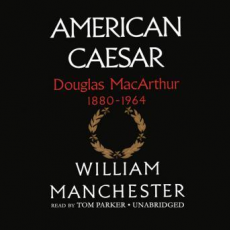
As you progress into higher education book reviews become less about what the book is actually talking about and more how the author does so. At degree level especially you need to consider how useful a particular book is in comparison to other books that already exist on the topic area. At school you are told what to read and often given textbooks but when you get older you are simply told to answer a question and have to find the books you wish to use for research yourself. Therefore it is important to be able to quickly reivew a book and decide if it is helpful for you. I will provide three book reviews based upon a similar topic in three articles (otherwise it will be far too long) and you can read and compare them and see how to determine what is important in reviewing a book.
Manchester, William. American Caesar, Douglas MacArthur 1880-1964. (Hutchinson 1979)
In this entertaining international best seller Manchester actively engages in deciphering the nature of General Douglas MacArthur, juxtaposing his character with the infamous Roman dictator Gaius Julius Caesar. Indeed Manchester states that, like Caesar, MacArthur was both ‘noble and ignoble,’ he was not lovable but won favour through military victories and glory. This desire for glory and a Roman sense of arrogance was to be his undoing ultimately and Manchester makes no effort to hide the growing sense of hubris throughout this chronological biography. In the grand history of foolhardy and brilliant US military generals Douglas MacArthur is one of the most controversial and is an incredibly complicated individual, proving himself to be a military genius on occasion but also ruthless and thoughtless at times. World War II Veteran William Manchester is no stranger to the act of warfare and the stratagem behind it and, though not a military historian per se, at first glance he appears to succeed where so many others have failed; that is to truly capture and understand MacArthur, the odious yet ‘great thundering paradox of a man’.
Manchester’s approach to explaining the bizarre General in American Caesar is to recount MacArthur’s entire life, providing an insight into his family history and how it ultimately sculpted him. With such a heavy military influence and sense of patriotism, even heroism, placed on young MacArthur’s shoulders by his father and grandfather, that Roman tradition of furthering your family name was definitely a great influence on his ambitions in life. Structured in a military fashion with the opening Reveille and closing Taps, Manchester writes to entertain and express his military knowledge as much as to provide a historical account. This being said, as a biography the book does not necessarily have to aim to do anything other than narrate MacArthur’s life but Manchester is worthy of recognition for his reasonable attempt at explaining such a complicated individual. Manchester does provide a comprehensive understanding of MacArthur’s career and, complete with maps and accounts of all his military campaigns this work covers his political, military and personal life. Some critical reviews agree that this total consideration of MacArthur’s life and not just his military history provides ‘a valuable dimension to the book’. The colloquial and almost satirical writing style probably lends much to the popularity of the book and it is in fact quite an enjoyable and even amusing read. Despite this there are some limitations to consider.

Despite the complete approach Manchester takes to this biography he unfortunately fails to differentiate some valid and important historical documents from several dubious sources, thus limiting the book’s credit. A prime example is Manchester’s reliance on Courtney Whitney as a source, whose book fails to contain any footnotes whatsoever. Though Manchester does note that Whitney should be considered and checked via other sources he still goes on to use him frequently throughout the book, often as key supporting evidence in an argument. Furthermore, Manchester relies heavily on the work of D. Clayton James’ first two books of his MacArthur series for the majority of American Caesar but James’ final book addressing MacArthur post WWII up to his death was not published until just over half a decade after Manchester’s complete biography and it is notable that in addressing these latter years Manchester refers to more skeptical sources. Indeed multiple critical reviews of American Caesar have agreed that the book’s merit is damaged by the latter years, Forrest Pogue stating that ‘one finds additional gaps’ in history once Manchester can no longer rely on James’ works and Mark Stoler identifying that the latter years are ‘marred by errors of fact and interpretation.’ Additionally, the colloquialism and rhetoric present in Manchester’s work, though somewhat amusing and entertaining (as mentioned earlier) damages the professionalism of the work to a degree. Such statements as ‘pausing to relight his corncob from time to time, he… made a conspicuous target’ and ‘Korea hangs like a lumpy phallus between the sprawling thighs of Manchuria and the Sea of Japan’ portray Manchester’s work as a story more than a history. Despite these limitations the book still provides a thorough biography of MacArthur that allows great insight into his personality and may help explain some of his decisions, particularly in his later life and career.
Manchester’s American Caesar rises above the bulk of biographical literature on General Douglas MacArthur, particularly the majority written in the 1950s-60s. He remains relatively neutral in comparison to many previous works on the general and portrays effectively both the many virtues and vices of MacArthur – ‘for every MacArthur strength there was a MacArthur weakness.’ Although D. Clayton James’ works are often considered to be academically superior to Manchester’s best seller, American Caesar brings a more complete analysis of the General’s nature and not just his actions which allows one to understand his often contradictory methods employed in his career. Combine this with Manchester’s refreshing style of literature and this book is undoubtedly deserving of a respectable position in its field.
IMAGE 1: http://covers.audiobooks.com/images/covers/full/9781433241659.jpg - One possible cover page of the book (there are multiple versions).
IMAGE 2: http://a2.files.biography.com/image/upload/c_fill,dpr_1.0,g_face,h_300,q_80,w_300/MTE4MDAzNDEwNjE1MTc0Njcw.jpg - William Manchester, the author.

0 Comment:
Be the first one to comment on this article.